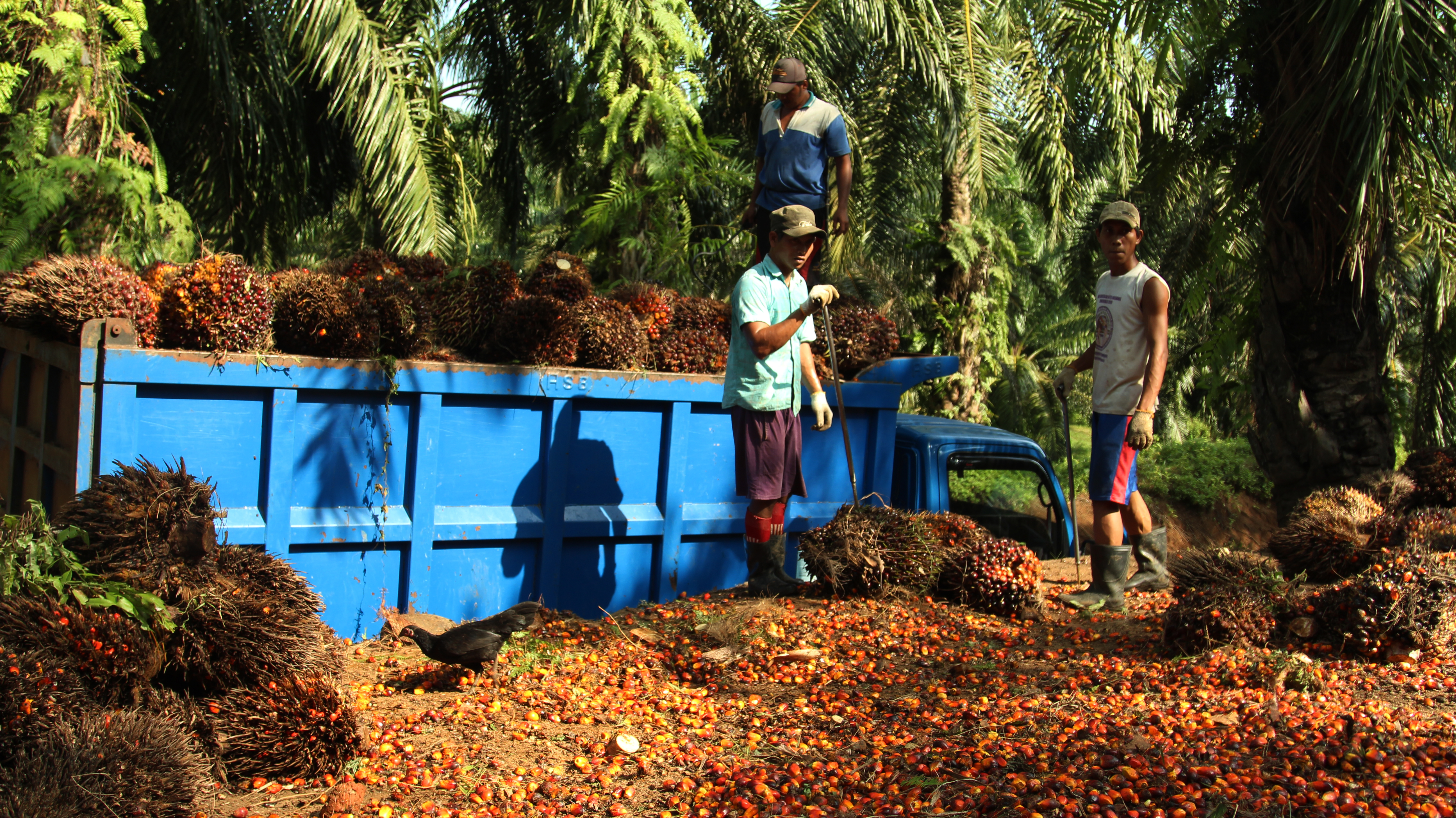One palm-oil trader after another has committed to helping protect forests this year. Now it’s much easier to buy palm oil on the international market from traders who have promised to halt deforestation than it is to buy palm oil from businesses causing deforestation. A year ago, you could have said just the opposite. These are voluntary corporate commitments; they aren’t guaranteed to translate to change on the ground. But they have worked before, in the Brazilian Amazon.
It’s not as if the whole problem of deforestation has been solved, and some people are worried about celebrating too soon. As Laurel Sutherlin, communications strategist for the Rainforest Action Network, put it in an email: “The corporations involved would like nothing more than for their critics to move on and look the other way while they get to the nitty gritty of actually putting their new statements into practice.”
Furthermore, there are still many companies involved in palm oil that haven’t made commitments, or haven’t fully fleshed out their policies. The palm-oil crisis isn’t over, but it has reached a critical inflection point — instead of just shouting from outside the gates, the environmentalists are inside, working hand in had with business leaders who have tremendous power to drive change.
I’m not worried that spreading the good news will cause people to tune out. I suspect that it will actually cause the opposite. Indeed, it’s the success so far that’s attracted my attention. This has gone from a typically dismal story to an inspiring tale about a massive shift in policy over a short period of time.
I wanted to understand exactly where we are in this struggle and how we had gotten to this inflection point, so I talked with Glenn Hurowitz, chair of Forest Heroes, which has been a major player in the palm-oil negotiations. (Hurowitz has also been an occasional contributor to Grist.)
Q. Why do we see this cascade of commitments around climate change and deforestation?
A. The biggest reason is a dramatic increase in civil society campaigning around the world on these issues. It works. If a certain amount of people mobilize in a strategic way on the right targets [snaps his fingers] — it can change everything.
Q. What are the moving parts in that? I mean, when you say civil society, that’s more than me simply calling up Cargill and asking them to please help stop deforestation. What makes them take people like you seriously?
A. Well, it is people like you calling them up, but on a larger scale. We’ve gotten hundreds of thousands or millions of people to weigh in, usually with the consumer companies. These people are their customers. So with our Kellogg’s campaign we deployed organizers on the ground. When college recruiters would go to campuses, hundreds of students came up to them and said, we don’t want to work for Kellogg’s as long as they are in bed with [palm-oil giant] Wilmar. We brought people from all over Michigan for a huge rally in front of Kellogg’s headquarters just before negotiations with Wilmar. And that ended up providing crucial leverage. [Once Wilmar made its sustainability pledge, other companies rapidly followed suit.]
It’s kind of extraordinary that people in Michigan can have such a big effect on a giant company in Singapore. But it works.
Q. So, if you can just set it up for us, where are we at with agriculture driving deforestation?
A. Our focus has really been on protecting tropical forests, which are the lungs of the Earth. Deforestation drives something around 15 percent of global emissions — more than all the transportation in the world. There have been dramatic reductions in deforestation in the Brazilian Amazon. It’s declined somewhere around 75 percent from its peak in 2004. New numbers just came out showing that deforestation has gone down 18 percent in the last year. This was a huge relief because, in 2013, it went up more than 20 percent after years of progress. We were worried that the new president of Brazil was not taking forest protection seriously. But our analysis suggests that perhaps 2013 was an anomaly.
It’s the biggest climate success story in the world. There is no country that has come even close to reducing emissions as much as Brazil has. By cutting deforestation, Brazil has cut emissions more than all the countries in the Kyoto protocol combined.
Unfortunately, that success is confined to the Brazilian Amazon.
Q. And are companies willing not just to move the problem, but to solve the problem?
A. We’ve already seen it happening. We were advising Ban Ki Moon on the climate summit. His office asked us what would be the big thing and how could we help. We said, well, if you could get Cargill to expand their palm-oil deforestation policies to all commodities, that would be a huge breakthrough. Wilmar had already done that. Wilmar is the largest buyer of soy from Latin America, the largest soy importer to China, it has a big global impact. So Cargill made that commitment.
Q. Can corporations really get behind land protection while fulfilling their duty to shareholders?
A. What’s interesting about the moment we are in is that you can achieve business goals while dramatically reducing impact on the environment. We’re not going to companies and saying, ‘we want you to stop doing agriculture.’ We are saying, ‘there are tens of millions of degraded acres that you can plant on, you can invest in increasing yields. And here’s a company that’s doing that and being very profitable. And here’s a country, Brazil, that’s increasing production year after year, and also dramatically reducing their deforestation.’
Q. Does that come as news to them?
A. I think to a great extent, yes. When we first started talking with Wilmar, the CEO said we’ve been focused on making money, and we haven’t been focused on sustainability. In our second meeting, he put his arm around me and said, Glenn, I’ve always delegated these issues to my staff, but I understand now how important they are and I’m going to take personal charge of them, and if anything doesn’t go well come to me directly. Which wasn’t a challenge, because he emailed me every five minutes.
That education process has been a huge part of what we’ve been doing over the last year.
Q. Whenever I do one of these stories about rainforest protection, or a major corporation announcing a sustainability initiative, I get people saying, can we trust these guys? Or even beyond that, there’s just this amygdala-level reaction: but it’s Cargill! So — can we trust these guys?
A. Well I think we are in a Ronald Reagan moment of “trust but verify.” We have been taking them on their word at some level, but also setting up the verification mechanisms to ensure they are fully adhering to their commitments.
Q. What does that look like?
A. We’ve generally insisted that these companies have a credible implementation partner. It’s usually been the Forest Trust, this organization that really goes out in the field, analyzes the supply chain, gets third-party plantations to change, and issues regular reports on compliance. There are other credible organizations, but we like the Forest Trust because we’ve seen them kick out members who are not living up to their obligations. Even when they are providing very significant revenue to the Forest Trust.
On another level, we and our NGO allies are investigating these companies, going on the ground and looking at satellite photos.
And finally I do think that many of these companies see this as the right thing to do, and they see a business incentive to do it.
Q. Behind that limbic-level anti-Cargill reaction, there’s a deeper philosophical question: If you are working with these corporations, it means you are just nibbling around the edges, rather than creating revolution. You are improving a flawed system, rather than overthrowing it.
A. I think that is a very legitimate critique. I don’t think this work is upending the entire model of monoculture agriculture. To simplify, it’s saying: What is in place can stay, but don’t cut down any more forests, don’t destroy more ecosystems, stop abusing human rights.
For me, protecting wilderness is creating a zone free of the market economy — when you go into the forest it’s one of the few places you can escape commerce. So that’s a beautiful thing.
Q. But do you see a possibility for tinkering our way toward a better system? When you go home at night, you know, you’ve helped make one of these deals happen and you are excited about it, do you feel like we are on the trail toward a zero-carbon economy? Or do you feel like you are just optimizing on the wrong track?
A. No, it’s transformative, and I wouldn’t be doing it if I didn’t think it was. If you look at soy in Brazil, it went from causing 25 percent of Brazilian Amazon deforestation to .25 percent in three years. And it spurred similar improvements in cattle. That is a huge improvement that you can be really proud of. I hope we achieve that in palm oil, pulp, and paper in southeast Asia, and similar stuff in Africa and other parts of Latin America.
We view the corporate commitments as a critical precondition to enduring change. We do this work in part to create political realignment. The companies that were once lobbying to undermine forest protection and community rights are now actually advocating for governments to regulate.
Q. We are doing this, so we want you to force our competitors to do it too.
A. Exactly. The companies that have adopted no-deforestation policies have been the most enthusiastic advocates of others doing the same.
The Indonesian president, in the last few weeks, has made a number of pronouncements about reevaluating palm-oil concessions on peat, pulp, and paper concessions, logging concessions. The way they are talking about it is different from the grand pronouncements that previous Indonesian governments have made. So I’m cautiously optimistic. He went to Sumatra with some environmental groups and basically engaged in an act of civil disobedience: He personally damned a peat drainage canal, which is what Greenpeace had been doing five to six years ago as an act of protest.
Q. Is it a little ironic that we who cut down all of our native forests in North America are telling people in other places not to do the same?
A. Well, we hear this all the time from palm-oil tycoons in Malaysia, and Sarawak in particular — which is the epicenter of peat clearance in the world. We met with these CEOs in July and endured long rants from them about what the U.S. had done a hundred years ago, what Europe had done over thousands of years. I’s true, yes, we did clear our forests. And people in that era very quickly realized it was a huge mistake.
Forest clearance in North America caused the same problems that Indonesia and Peru are now experiencing: huge erosion, pollution of the waters, essentially genocide for native people — which is absolutely happening in the tropics. So America is rapidly reforesting, and has been for many years. So is China, so is India, so is Vietnam. Many developing countries see it’s in their self interest to increase forest cover. They see it makes rainfall regular and usable by agriculture, provides outdoor recreation, wildlife habitat, etc.
The idea that the modern vision for development requires destroying your forests is crazy and counterfactual. It’s a fundamental myth at the core of our civilization. For hundreds of years we’d associated the march of progress with the conversion of native ecosystems to monocultures that serve only man. What’s happening now is upending that assumption.




